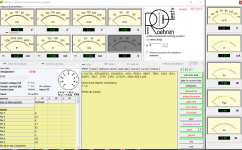From what I can gather, you are building a "computer", motherboard with daughter cards. Is a card specific to a range of tubes ? Not sure.
10 of the PCB's are relay boards with total of 60 relays.
The output of the relay matrix aggregates to any standard "plug-in" tube socket (up to 10 pins). There are NO sockets on the tester. Individual sockets mount as a simple plug in modules.
Basically the matrix is controlled by an on-board microprocessor and a database allows any pin to be assigned any function, task, and voltage as per the specs for almost all tubes.
An attached computer manages the database, tube selection, and testing criteria, and test results. All automatically. (no switches and dials, no look up tables). E.g, select KT150, 303B, etc. and press test.
THE controlling software (windows based) connects via USB. It is now also network compatible. You can install the software to a network drive that can be accessed by multiple clients. The database program as well as the measuring software can access the network drive.
If you have the specs for a tube and an appropriate socket -
add the specs to the database and plug in the appropriate socket.
I would be very surprised if the database does not already hold almost every know (up to 10 pin) tube type.
There is also a way to test tubes greater than 10 Pin (out-board the heater pins).
computer screen shot
The output of the relay matrix aggregates to any standard "plug-in" tube socket (up to 10 pins). There are NO sockets on the tester. Individual sockets mount as a simple plug in modules.
Basically the matrix is controlled by an on-board microprocessor and a database allows any pin to be assigned any function, task, and voltage as per the specs for almost all tubes.
An attached computer manages the database, tube selection, and testing criteria, and test results. All automatically. (no switches and dials, no look up tables). E.g, select KT150, 303B, etc. and press test.
THE controlling software (windows based) connects via USB. It is now also network compatible. You can install the software to a network drive that can be accessed by multiple clients. The database program as well as the measuring software can access the network drive.
If you have the specs for a tube and an appropriate socket -
add the specs to the database and plug in the appropriate socket.
I would be very surprised if the database does not already hold almost every know (up to 10 pin) tube type.
There is also a way to test tubes greater than 10 Pin (out-board the heater pins).
computer screen shot
Attachments
And to add to Neville’s question - an approximate estimate of the total build time (say compared to building a tu8600)
I've considered the RoeTester, but the complexity and cost were beyond my needs.
There are a few additional options (albeit probably not as capable as the RoeTester), such as the uTracer which is fairly cheaper, and the eTracer is somewhere in-between in terms of cost, but does come with the PCB fully assembled and tested.
There are a few additional options (albeit probably not as capable as the RoeTester), such as the uTracer which is fairly cheaper, and the eTracer is somewhere in-between in terms of cost, but does come with the PCB fully assembled and tested.
There are 21 PCB's and over 4,000 solder joints.What is the difficulty level and can you compare it to any of the Elekit kits?
This alone, plus you need to source 90 percent of components yourself puts it at a 10X complexity to any Elekit project.
Suddenly I find myself less drawn to this now 🙂
Thx for your reply and keep us updated on your progress.
Thx for your reply and keep us updated on your progress.
WIP
Finished designing and building rail sliders and socket fitting
 https://flic.kr/p/2mEM22r https://www.flickr.com/photos/64593884@N08/
https://flic.kr/p/2mEM22r https://www.flickr.com/photos/64593884@N08/
 https://flic.kr/p/2mEHGeE https://www.flickr.com/photos/64593884@N08/
https://flic.kr/p/2mEHGeE https://www.flickr.com/photos/64593884@N08/
211 socket box connected into ROE
 https://flic.kr/p/2mEHGeE https://www.flickr.com/photos/64593884@N08/
https://flic.kr/p/2mEHGeE https://www.flickr.com/photos/64593884@N08/
Finished designing and building rail sliders and socket fitting
 https://flic.kr/p/2mEM22r https://www.flickr.com/photos/64593884@N08/
https://flic.kr/p/2mEM22r https://www.flickr.com/photos/64593884@N08/ https://flic.kr/p/2mEHGeE https://www.flickr.com/photos/64593884@N08/
https://flic.kr/p/2mEHGeE https://www.flickr.com/photos/64593884@N08/211 socket box connected into ROE
 https://flic.kr/p/2mEHGeE https://www.flickr.com/photos/64593884@N08/
https://flic.kr/p/2mEHGeE https://www.flickr.com/photos/64593884@N08/I would like a tube tester of some sort. I considered the Roe Tester and also Etracer. Not sure which is better?
Would be nice if even an assembled main board was available.
Or maybe a group buy project where a PCB fab house stuffed the boards.
Is there a BOM available for Digikey or Mouser?
Would be nice if even an assembled main board was available.
Or maybe a group buy project where a PCB fab house stuffed the boards.
Is there a BOM available for Digikey or Mouser?
ROE is too dfficult to build..
Etracer will assemble for you.
I understand but is Etracer as good as the Roe Tester?
